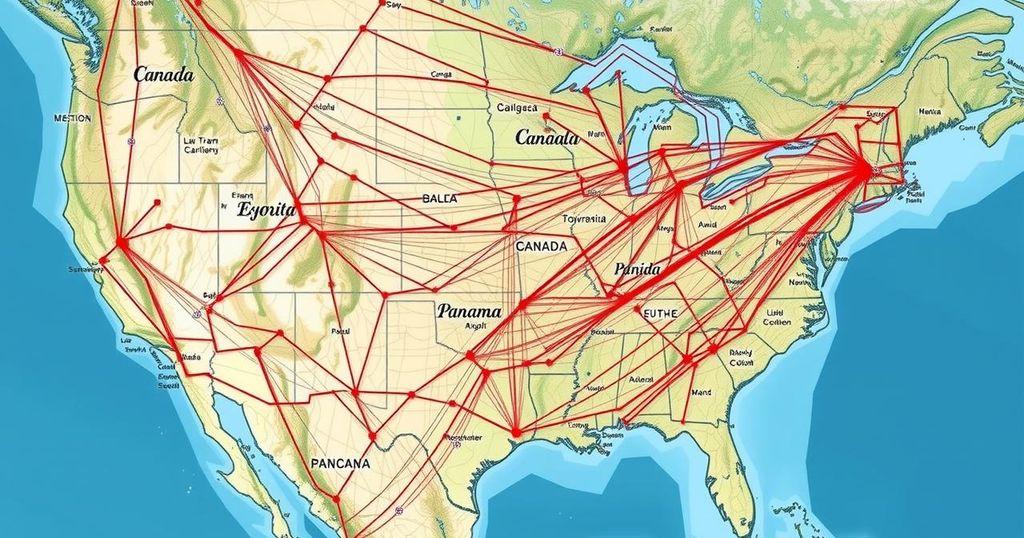President-elect Donald Trump has proposed territorial expansion of the U.S. into Canada, Greenland, and ownership of the Panama Canal, prompting significant political commentary. His remarks reflect a blend of serious aspirations and rhetorical strategies meant to engage his base. Responses from leaders in Panama and Denmark underline the challenges and implications of such claims for U.S. foreign relations.
Donald Trump, the President-elect, has ignited discussions about potential U.S. territorial expansion, proposing ideas that evoke the historical acquisitions of the Louisiana Purchase and Alaska. Recently, he has suggested Canada’s incorporation as a U.S. state, the reclamation of the Panama Canal, and the acquisition of Greenland. It remains ambiguous whether his comments are serious proposals or merely rhetorical devices intended to draw media attention and energize his political base.
During remarks at a conservative gathering, Trump indicated a preference for lowering tolls for U.S.-registered vessels using the Panama Canal, hinting at possible pressures to negotiate with the Panamanian government. His claims of interest in Greenland were reiterated, as he labeled its ownership crucial for national security purposes. Such commentary reflects a revival of ideas reminiscent of the 19th-century doctrine of Manifest Destiny, suggesting a perceived right for the U.S. to expand its territory.
Moreover, Trump proposed designating foreign drug cartels as terrorist organizations, which raises concerns about potential military action on Mexican soil—moves that could threaten U.S.-Mexico relations. Specifically, Trump has made alarming threats against cartel operations, indicating an aggressive stance that could alter international frameworks.
Trump’s transition team has refrained from clarifying the sincerity of these expansionist suggestions, redirecting inquiries back to his statements. Advisors have noted that Trump often takes an interest in issues raised by others, especially those that resonate with his economic priorities, such as trade.
Panama’s President, José Raúl Mulino, rebuffed Trump’s claims about the canal’s operations, emphasizing Panama’s sovereignty over the waterway that has seen improved management since its transfer from the U.S. in 1999. Likewise, Denmark’s officials dismissed Trump’s renewed interest in Greenland, reiterating that it is not for sale and expressing eagerness to collaborate on strategic matters.
While Trump’s remarks regarding Canada appear more playful than serious, they continue to provoke the dialogue on U.S. territorial ambitions. His rhetoric surrounding tariffs has effectively drawn Canadian and Mexican leaders closer to the negotiating table, illustrating his unconventional approach to foreign relations.
In essence, Trump’s recent comments on expansionist aims stir historical parallels and contemporary implications, promoting a narrative of American nationalism that could reshape U.S. foreign policy in multiple dimensions.
The article explores President-elect Donald Trump’s provocative statements about the possibility of U.S. territorial expansion into Canada, Greenland, and the Panama Canal. These remarks highlight a potential shift in U.S. foreign policy under Trump’s administration, reminiscent of historical doctrines like Manifest Destiny. The dialogue also raises concerns about international relations, particularly with Panama and Denmark, as well as implications for U.S.-Mexico relations regarding drug cartels. The landscape of international diplomacy may be impacted by these bold claims, as they reveal Trump’s inclination to blend populist rhetoric with traditional national interests.
In summary, Donald Trump’s recent comments about U.S. expansion into Canada, Greenland, and the Panama Canal prompt significant questions regarding his foreign policy approach. While some suggests that these ideas are serious, they could also serve as tactical maneuvering intended to capture attention and advance his political agenda. The responses from international leaders underscore the complexities involved in such discussions and may influence future diplomatic interactions. Ultimately, Trump’s assertiveness on these matters suggests a potential shift towards a more nationalist and interventionist U.S. policy framework.
Original Source: www.cnn.com






